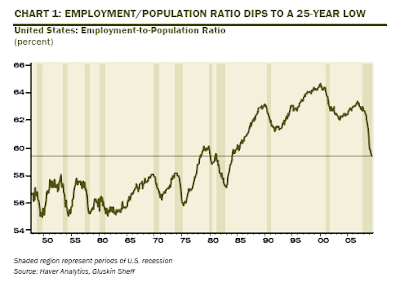Today’s employment report is being treated as a ‘green shoot’ of major proportions. While it was by far the best jobs performance of the year, much of the better-than-expected tally in nonfarm payrolls reflected the bounce in auto production as well as the distortion from the federal census workers. Combined, these two influences effectively “added” 100,000 to the headline number, so net-net, the consensus view of -325,000 was not as far off the mark as the market believed at first glance.I talked about the participation rate this morning in Jobs Contract 19th Straight Month; Unemployment Rate Inches Lower to 9.4%
The auto sector added 28,200 to the industry payroll in July, which was the highest tally in 11 years. To show you just how big that really is, it is a 69% annualized surge. Normally, the industry, which is in secular decline, posts job losses of between 20,000 and 30,000 consistently, so this alone represented roughly a 50,000 swing. We estimate that there was about a 30,000 swing in the rest of the manufacturing sector due to the spillover from the current inventory adjustment in the motor vehicle industry. The 0.3% MoM increase in the workweek was also skewed by the 4.1% MoM jump in the auto sector.
As we mentioned, there have been large fluctuations in the federal government payroll too. After hiring a slew of Census workers in the spring, there were 57,000 layoffs in May-June and then we saw in today’s report that 12,000 federal workers were “hired” in July. Again, mathematically, this contributed about 20,000 to today’s headline number. In other words, and we have no intent on raining on anyone’s parade, there was about 100,000 non-recurring payrolls in that top-line figure. It may be dangerous to extrapolate today’s report into a view that we are about to fully turn the corner on the job market front.
Yes, the income number was also firm; average weekly earnings popped 0.5%, but again, this reflected the bounce in the auto sector as well as the 10.7% increase in the minimum wage to $7.25 an hour. Again, this is a non-recurring item and does not at all reflect an improvement in underlying income fundamentals in the personal sector. We had a similar bounce in the summer of 2008 when the minimum wage was last boosted.
To be sure, the drop in the unemployment rate was a surprise, but it was all due to the slide in the labour force — the employment-to-population ratio gives a more accurate picture of the slack in the labour market and the hidden secret in today’s report was that this metric slid to a 25-year low of 59.4% from 59.5% in June and 61.0% at the turn of the year. Of those unemployed, 33.8% of them have been unemployed now for over 27 weeks — a record amount (was at 29.0% in June and was at 17.5% at the start of this recession).
Taking one time auto sector anomalies and manipulation of the participation rate into consideration, today's job report was much weaker than looks at first glance.
As I said earlier, "The BLS stopped counting".
Mike "Mish" Shedlock
http://globaleconomicanalysis.blogspot.com
Click Here To Scroll Thru My Recent Post List

Không có nhận xét nào:
Đăng nhận xét